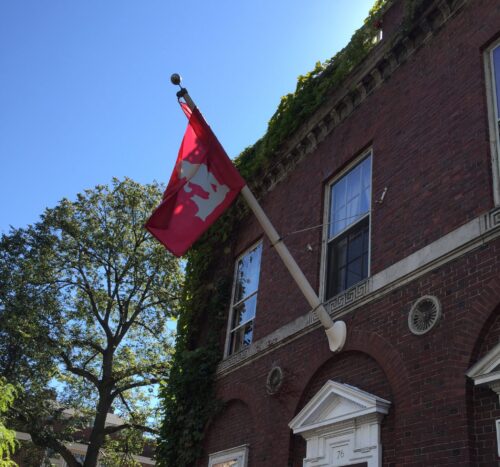What a co-ed Spee does for Harvard’s social scene.
When women asked for rights, misogynists asked if that meant it was okay to punch them. But finally, the Spee club has gone ahead and done just that. This is the year when it’s finally okay to punch women, but it’s really the patriarchy that’s taking the beating.
Women have only been accepted to Harvard College within the last 50 years, yet social groups continue to exclude them. Single-gender social groups extend beyond the final clubs. The age-old justification of preserving these exclusive spaces has been “history” or “tradition,” yet Harvard has never been one to get left behind. While traditions may strengthen the Harvard community in some aspects, using them as an excuse to perpetuate male-only spaces where women lack a space for leadership hinders Harvard’s growth.
For decades, final clubs have been the definition of an old boys club. However, rather than sticking to over 150 years of history vetting the exclusion of women, the Spee Club has chosen to open up their punch process. The harsh criticism of exclusive social organizations on behalf of Dean Khurana has brought attention towards these spaces and the absence of a welcome environment for all Harvard students. The inclusion of women into these clubs may not be the end of sexist behaviors on behalf of such social groups, but it does spark discussion.
Other student groups have also received flack for choosing exclusivity over selectivity. The Hasty Pudding Theatricals has been receiving criticism for letting women have key roles behind scenes but neglecting to invite them onstage. Men dress up in drag as women, yet women cannot join the Hasty Pudding cast. Last year’s “Woman of the Year” Amy Poehler, commented publically on this sexist exclusion of women performers. Women work on the business staff, tech crew, costume design, and writing staff; women play in the band and are elected to the student board; they serve the cast by dressing, lighting, organizing, and playing for them, yet they have yet to be welcomed onstage. Now, however, the curtain is closing on that accepted behavior and women are protesting these traditions and auditioning, despite the rules banning them, for the theatrical club.
As prestigious groups with strong networks of alumni supporters, like the final clubs and the Hasty Pudding, begin to recognize women as viable members, Harvard becomes a more inclusive space. When women are not invited into these social spaces, they miss out on the opportunities to vast networking connections, as well as on the chance to become alumni themselves who can give women a voice on powerful graduate boards in years to come. By failing to include women, these groups have given Harvard’s male students more resources during their years on campus as well. Members of exclusively male clubs giving access to mansions in and around Harvard, professional advantages, and other positions of social power, means that the women of Harvard College are unable to experience the opportunities men have access to.
Spaces with a female focus have not gotten as much recognition as male groups have in the past. Groups like The Harvard Women’s Center aim to advocate for female empowerment and offer inclusive spaces for all genders, though few men join. Unlike The Women’s Center, female final clubs and sororities do not typically have their own social spaces and do not include men. These organizations also have shorter histories and fewer resources available to them than their male counterparts.
Harvard’s administration has also made great strides in reforming policies on gender. For the first time this year, students were given the opportunity to designate their preferred gender pronouns when registering with the FAS. By allowing students to indicate the ways in which they identify, the college validates students, regardless of gender. The inclusion of all genders [say goodbye to the binary] allows for a community that not only invites, but also embraces all students.
The fluidity of gender does not fit well within the rigid traditional structure students find in Harvard’s social spaces. Allowing women to take hold in these organizations opens up the door to more open conversations about how to make these spaces more inclusive and safer for the community. Extending the invitation to women is the first step in creating a more diverse social scene, which will, in turn, will allow these exclusive spaces to address the other issues raised against them by the community with more insight and perspective.
Our history is one of male dominance and female exclusion. Congress was once an all male institution, as was Harvard, as were most professions and most organizations. However, slowly over time, women are gaining ground. Much like the policies in place that have long kept women out of the clubhouse, the Harvard community is changing and calling for action. Maybe this is the year of the woman, or maybe it’s just the year we recognize not everything has to be about men.
Hunter Richards ’18 (hrichards@college.harvard.edu) is breaking the glass ceiling, one punch at a time.

